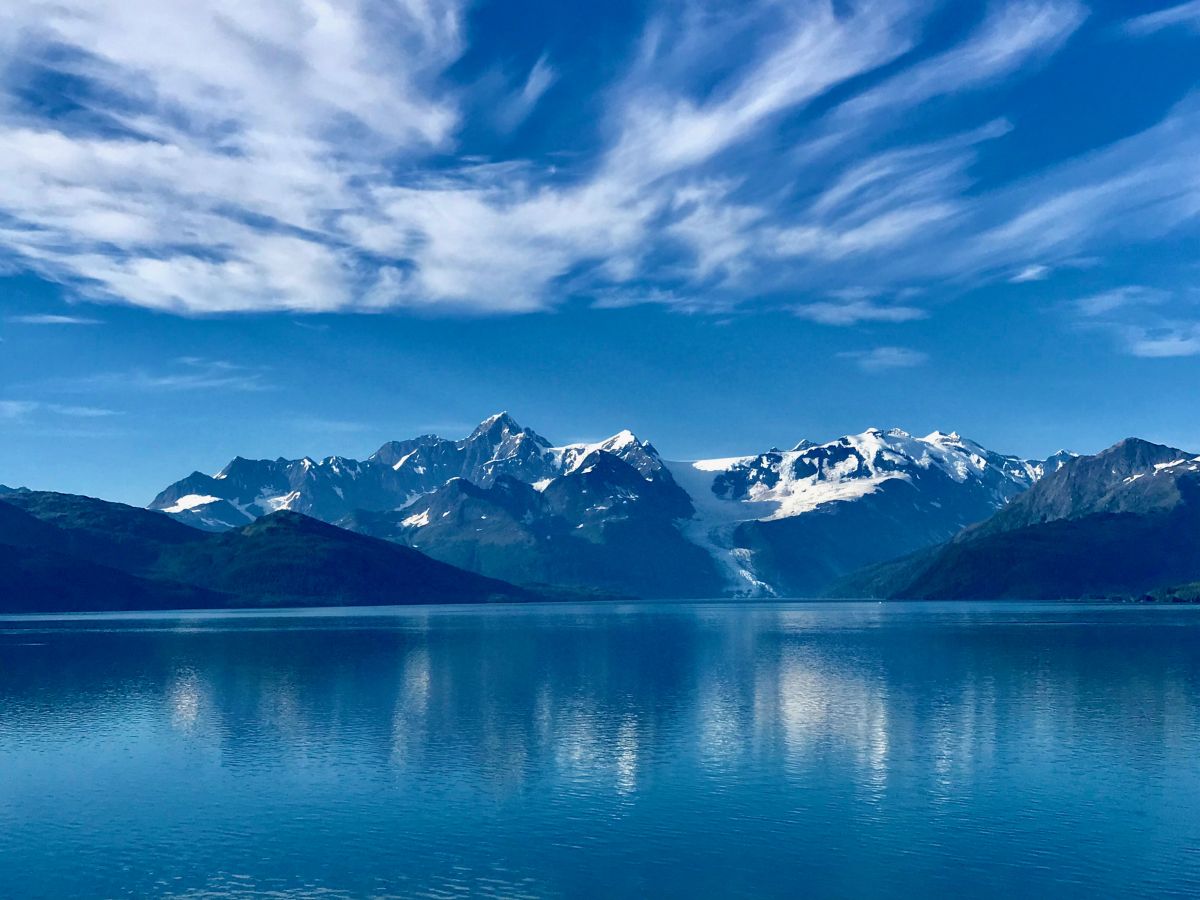


In Italian
How to plan a journey to Alaska and – above all – where to start from?
How to be able to choose and plan the most complete and safest possible itinerary?
How many days it takes and what budget to estimate? What is the best time to go there? How to move?
These are only a few of the questions I was asked on the social networks and via email during and after my latest journey to Alaska.
So I thought to answer all these questions even before writing the complete itinerary – confident of both my experience on the field after 17 travel days and a long and detailed study previously. All these questions are divided into matters, in order to be really helpful to whom wish explore and discover deeply this surprising and fascinating U.S. state (the 49th precisely).
“To the lover of wilderness, Alaska is one of the most wonderful countries in the world”
(John Muir)
Why to choose right Alaska?
Certainly for nature – uncontaminated and wild more than in any other state in the USA.
For one among the richest and variegated faunas in the country (even three species of bears, American elks, caribous, rams, Alaskan eagles, red foxes, silver beavers, et cetera…), the boundless spaces, the Northern Lights, the millenary glaciers, the highest and most fascinating mountain peaks and consequently for the remarkable number of climbing and trekking paths.
For sailing among the breathtaking inlets of the Inside Passage, the exploration of the most authentic villages of the Alaskan Athabascan populations – among the most ancient American Natives groups in the continent – and for a series of historic and literary reasons: The Klondike Gold Run and the mythic passage through the Yukon, the golden mines and the wonderful pages of notes by explorers like John Muir and John Burroughs, and then Jack London and its “White Fang” and “The Call of the Wild”. And a series of modern writers inspired to “The Wild Lands of the Great North” over time.
Then there’s the one who chooses Alaska to chase the “myth” – positive or negative, each of us has its own idea about it – of “Into the Wilde” by Chris McCandless.
You know the Alaskans don’t love so much neither the book nor the movie nor to be forced always more often to “recover” those improvised travelers – most of time unprepared to the rough conditions of the land – arrived as far as here only to follow Christian’s itinerary and to reach the notorious Magic Bus where he died after 112 days of isolation in the furthermost area of the Denali National Park.
One, ten, hundred different reasons to choose enjoying this unforgettable experience and recover the major possible information about how to plan a journey to Alaska.
It doesn’t matter whatever is yours, what matters is getting well prepared – and in advanced – for a journey which cannot be absolutely improvised and which will be probably one of the most intense and exciting ones in your life.
The best time to visit Alaska goes from mid-May until mid-September.
During the rest of the year an important portion of land – the Inside Passage, the Bush, the inner part of Denali, the Aleutian Islands and some areas of the Kenai Peninsula – becomes practically impassable due to cold, snow and ice, so exclusively the less rough areas are the only accessible ones.
The highlight months with a major crowd at a tourist level are July and August. Due to the high season, travelling in this period can be certainly more expensive as regards accommodations and rental car and furthermore you have to consider the presence of gnats and mosquitos which – unfortunately – in this particular time of the year are present in large quantities also in Alaska.
Due to personal logistic matters I had to plan my journey in September and I must admit that it was a successful choice for a series of reasons.
First of all the less tourist crowd and consequently a light decrease as regards the total amount of the journey, the possibility to enjoy Alaska in one of its more suggestive seasons – Fall – enjoying a foliage that has nothing to envy to the New England one. And the chance to watch – it happened more times in the same journey, both in Denali and the Arctic Circle near the Yukon River – the amazing Northern Lights, which here start to show from the end of August.
If you take into consideration to travel to Alaska in September remember that however in many areas – Denali and neighboring areas, Inside Passage, Kenai Peninsula, Bush – the tourist season for many facilities ends drastically on September 15th. So the choice of accommodations for the rest of the month it reduces remarkably, despite the climate can be still mild and favorable.
Alaskans are naturally welcoming people, however – as it often happens for communities developing in extreme environments, at the ends of the world – they live according to their own times and needs and don’t allow in any way that their own habits are modified, above all by the presence of travelers/tourists.
Few rules to avoid unpleasant situations and answers.
Be respectful of people and land. Don’t expect a quick service – take it easy, they repeated to me in many occasions – in hotels, stores, restaurants or simply requiring tips and info. Always ask for the permission before taking a photo of people, above all in the Native Americans communities.
Due to the “extreme” geographical position and the remarkable presence of animals – not only in the parks, but also along the roads and in towns – it’s better to always pay a lot of attention to one’s own safety.
Don’t venture into paths you don’t know without having asked the ranger first and without the right equipment. Camping only in the properly areas, where it is advised refers only to expert guides and don’t move alone by car to the furthermost areas.
For example, the wonderful Dalton Hwy, the suggestive road which through the passage of the Arctic Circle links the Arctic Sea to Fairbanks.
It is considered one among the 10 most dangerous roads in the world – rightly, according to me, above all after have covered it in some parts. Many people venture into it and they are forced to ask for help or go back after few hundreds km because of the dirt roads, the humps, the corners straight down to the nothing, animals crossing the roads suddenly and because of the scarce presence of gas stations and cell reception along the route.
The most important tip: never forget to check the weather conditions before an excursion. Weather changes suddenly in Alaska and a wonderful sunny day can turn quickly into the perfect storm.
Alaska is boundless.
It is not only the biggest state of the USA, its territory is as big as almost a third of the extension of the other 48 continental states.
And above all it changes remarkably according to the regions you visit, offering variegated and extremely different landscapes. Usually the tourist circuit concentrates on the Anchorage (Turnagain Arm and Mat Su included)-Denali-Fairbanks route, completely leaving out areas beautiful and suggestive as well, according to me.
I know well that time of staying and expense in Alaska can make the difference. The ideal it would be to plan a more articulated long distance itinerary, so that you have more resources and availability in your hands and the possibility to save where it is possible, moving in advance searching for the flights and bookings.
My tip is to think about a journey of about 12/14 days (about 20days is perfect) and that above all include the Inside Passage – according to me the most beautiful part – possibly a portion of the Kenai Peninsula and the Dalton Hwy, at least as far as the Arctic Circle.
My 17 days itinerary (then I will write about it in detail) was developed over 12 months, after have read books, several tourist guidebooks and – above all – direct experiences of international travelers.
I divided it as it follows:
All!
Car is the ideal means of transport to explore totally alone the Kenai Peninsula and cover4 the route Anchorage-Denali-Fairbanks. Rental costs in Alaska are higher compared to the other U.S states for a series of reasons I’ll explain in the following paragraph.
Train is very recommended to cover the panoramic route from Whittier (if you arrive via sea), from Seward (if you want to cover the route leaving from the Kenai Peninsula) or Anchorage towards Denali NP and Fairbanks.
The McKinley Express arrives to Talkeetna near Denali NP, while the Explorer arrives as far as Fairbanks with a series of stops along the route, among them Talkeetna and Denali NP. They are very efficient trains with semitransparent cars offering an amazing view of the path.
You can book the route you like most on the Alaska Railroad official website.
And what about ship?
If you want to explore the Inside Passage you have only three possibilities. Move by Seaplane (it corresponds to book at least 4/5 flights). Use the line ferries (they have inconvenient times and don’t arrive everywhere). Or go on a 5/7 days’ cruise that from Vancouver – one of the Canadian gates to Alaska – will allow you to cross the whole straits and the inlets through the wonderful Alaska Marine Highway, the only marine Hwy of the USA crossing in 1667km all the Inside Passage. I opted for the cruise in order to be able to cover it entirely and stop at the several natives and locals’ settlements along the canals.
I had read wonderful things about this strip of Alaskan land suspended between Canada and Northern Pacific Ocean, but I was puzzled about the choice of cruise and ship, considering that I don’t love particularly life onboard and the “downtime” it involves. After a careful selection I’ve opted for an Alaskan company, very important on the land – the Princess – working exclusively with guides and local natives supporting their own communities and organizing during sailing a series of meetings with rangers and experts of the Inside Passage.
It was the best choice I could do: according to my experience the Inside Passage worth it alone the journey to Alaska.
Alaska is expensive.
Yes, it’s true, travelling to this wonderful land is more expensive than having an on the road to the South West USA or to the New England, but it’s not impossible. Don’t exaggerate. I’ve found even more expensive from an economic point of view Chile or Easter Island, Argentine Patagonia, a New Year’s Eve in Russia at the National Hotel in Moscow or the Us Virgin Islands.
Alaska is a far off country and in part inaccessible during the long winter months, many primary goods are imported and consequently everything has a major cost. Alaskan people as residents benefit from some advantages like the possibility to hunt and fish in naturalistic reservations otherwise inaccessible (the word “Preserve” in the writing of many National Parks states exactly this) or some bonus on the wages and taxes.
My tip is to move well in advance with the bookings and the flights so that you have more choice and the possibility to find better prices.
As I’ve written many times, a such journey cannot be improvised. It has to be planned in details for a matter of safety first and all the rest then.
That said, let’s do the math:
Summing up:
Alaska is an expensive destination, but not unaffordable and considering the beauty and the wonder of the journey ahead of you, it worth it to do some little sacrifices to enjoy this experience at 360°, without depriving ourselves of anything.